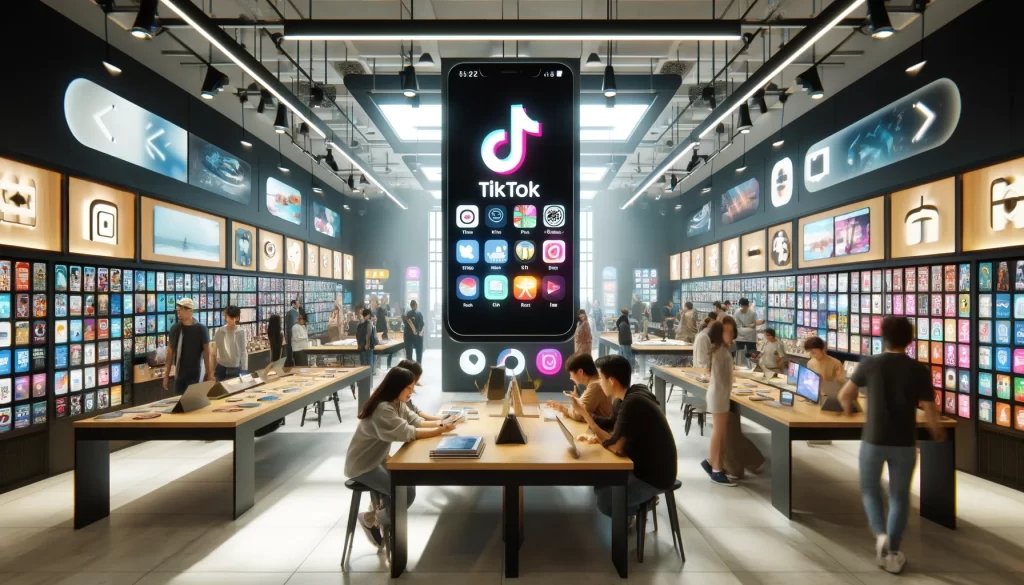President Joe Biden signed a new law on Wednesday that poses a serious challenge to the popular video-streaming app, TikTok. Owned by the Chinese company ByteDance, TikTok now faces the threat of being banned in the U.S. unless it is sold to a non-Chinese owner within the next year.
This law represents a critical point in the relationship between American national security interests and Chinese technological enterprises. TikTok, a platform that relaunched in 2017 after ByteDance acquired the karaoke app Musical.ly, has since been a focal point of scrutiny by U.S. security agencies. These agencies express concern over the potential influence the Chinese government could have on the app, fearing that it could be used for purposes that may compromise American security and privacy.
Despite these concerns, TikTok has experienced meteoric growth and influence. It is particularly popular among younger Americans, with around 170 million users in the U.S. alone. This accounts for about half of the nation’s population, and a significant portion of these users, particularly one-third of young people, rely on TikTok for news, as highlighted by research from the Pew Research Center.
The law was introduced as part of a larger legislative package that also included foreign aid provisions for countries like Israel, Ukraine, and Taiwan. Specifically, it requires ByteDance to divest its interest in TikTok within 12 months, failing which the app could be forcibly shut down in the U.S. This would involve making it illegal for web-hosting services to support TikTok and obliging major app stores like those operated by Google and Apple to remove TikTok, effectively making the app inoperable over time.
The legislation has sparked a variety of responses. While some view it as a necessary step to protect American privacy and security, others criticize it as an overreach that infringes on free speech. Senator Maria Cantwell, a Democrat and the chair of the Senate Commerce Committee, emphasized that the intention behind the law is not to target TikTok specifically but to safeguard against potential espionage and harmful activities by foreign adversaries.

TikTok, for its part, has announced plans to challenge the law in court. A spokesperson for TikTok stated, “We believe the facts and the law are clearly on our side, and we will ultimately prevail,” asserting that the law unjustly suppresses the free speech of millions of Americans.
Critics, including Kate Ruane from the Center for Democracy & Technology, argue that the law is a threat to free expression and that instead of banning platforms, Congress should focus on creating comprehensive privacy legislation that would protect user data across all online platforms.
Furthermore, selling TikTok might not be straightforward. Any potential buyer would need to gain approval from the Chinese government, which has previously shown resistance to forced sales and has significant control over TikTok’s advanced algorithm—this technology is crucial for curating personalized content for users and is protected under Chinese export-control laws.
This legislative move came as a surprise to many, particularly within TikTok, which had been navigating through various legislative challenges and had previously been given a shorter time frame to secure a buyer. This new law extends the timeline slightly, providing a bit more room for TikTok to comply or to challenge the ruling legally.
Critics like Senator Edward Markey argue that while concerns about digital security and privacy are legitimate, they should be addressed holistically across the tech industry rather than singling out TikTok. He points out that the issues of data privacy and the mental health of young users are not unique to TikTok, adding, “American companies are doing the same thing, too.”
This article is based on the following article:

Background Information
With this background, readers can better understand the complexities of the situation involving TikTok, the broader geopolitical tensions, and the debates over privacy and security in the digital age.
U.S.-China Relations and the Tech War
The relationship between the United States and China has been complex and multifaceted, involving elements of cooperation, competition, and conflict. Over the past few decades, both countries have emerged as major global powers with significant influence on international trade, technology, and security.
In recent years, the relationship has grown more strained, particularly in the realm of technology. The U.S. government has expressed increasing concern over the security risks posed by Chinese technology companies. These concerns are primarily based on fears that the Chinese government could use these companies to gather intelligence, conduct espionage, or exert undue influence abroad. This is part of a broader conflict often referred to as the “tech war,” which includes disputes over trade, technology transfer, and the global dominance of the tech industry.
Digital Privacy and Security
Digital privacy refers to the right of individuals to control their personal information and protect it from unauthorized access in the digital world. Digital security involves the measures and practices put in place to ensure this privacy as well as protect data from attacks and breaches.
In the context of apps like TikTok, concerns center around how data is collected, stored, and used. The fear is that user data could be accessed by foreign governments or other entities without users’ consent, potentially leading to surveillance or other forms of exploitation. These concerns are exacerbated by laws in some countries, such as China, which might compel companies to hand over data to the government under certain circumstances.
Role and Influence of Social Media Platforms
Social media platforms like TikTok have transformed how people, particularly young people, communicate, consume media, and form their perceptions of the world around them. TikTok, known for its short-form videos, has become immensely popular due to its engaging content and highly personalized user experience driven by powerful algorithms.
These platforms not only serve as entertainment sources but also as important channels for news and information. However, this role also comes with responsibilities and potential risks, as the spread of misinformation and the impact on mental health and privacy become concerns.
Implications of TikTok’s Algorithm
TikTok’s algorithm is a sophisticated tool that recommends videos to users based on their past interactions, preferences, and behavior on the app. This personalization is one of the reasons for TikTok’s success but also a point of contention in the privacy debate. The algorithm’s ability to keep users engaged makes it valuable, but it also raises questions about the influence of such technology on public opinion, privacy, and user behavior.
Legal and Regulatory Framework
Understanding the legal and regulatory landscape is crucial. In the U.S., there are ongoing discussions about how best to regulate tech companies to protect users’ privacy and security without stifling innovation and free speech. The actions taken against TikTok can be seen as part of these broader efforts to address the challenges posed by the integration of global tech companies into American social and political life.

Debate/Essay Questions
- Do the benefits of social media platforms like TikTok outweigh the potential risks to user privacy and national security?
Please subscribe to Insight Fortnight, our biweekly newsletter!
